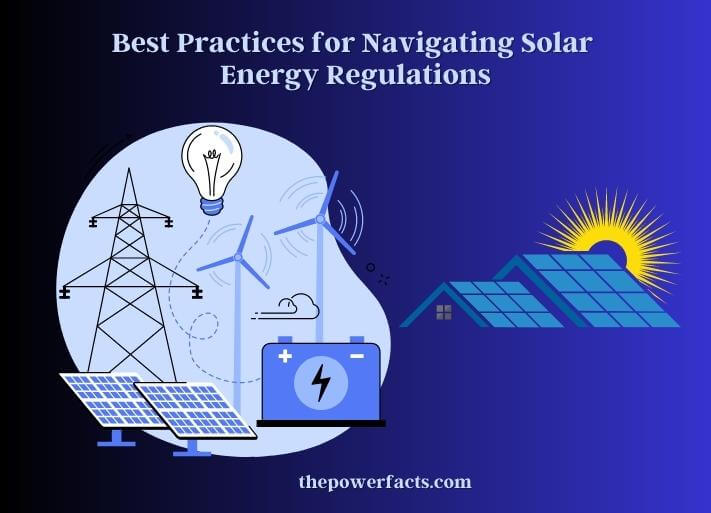Solar energy is a renewable and sustainable energy source that is becoming increasingly popular worldwide. The use of solar energy has grown tremendously in recent years as people look for alternative sources of energy that are eco-friendly and affordable. The cost of solar energy has been declining rapidly, making it an attractive option for residential and commercial use.

Investing in solar energy is not just about purchasing solar panels and installing them on a rooftop. It involves navigating through a complex regulatory landscape that is governed by various Federal, State, and local regulations. Understanding the regulatory framework is crucial for anyone interested in investing in solar energy. Failure to comply with the regulatory requirements can result in significant fines and legal issues.
Navigating the complexities of solar energy regulations can be daunting, but it is essential for anyone looking to invest in solar energy. It requires careful planning, research, and coordination with various regulatory agencies. Without a clear understanding of the regulatory landscape, investing in solar energy can be risky and costly.
What Are Solar Energy Regulations?
Solar energy regulations are laws and policies put in place by federal, state, and municipal governments to regulate the installation, operation, and maintenance of solar energy systems. These regulations can cover a wide range of issues, including zoning and land-use regulations, building codes and safety standards, permit requirements, interconnection standards, net metering policies, and renewable energy mandates, among others.
The purpose of these regulations is to ensure that solar energy systems are installed and operated in a safe and responsible manner, that they meet certain quality and performance standards, and that they are compatible with other land uses and energy infrastructure. By establishing clear rules and standards for solar energy development, these regulations can help to protect public health and safety, promote economic growth, and address important environmental and energy issues.

Solar energy regulations can vary widely from one jurisdiction to another, and they are often subject to change as technology and industry practices evolve. It is important for individuals and businesses involved in solar energy projects to stay up-to-date on the latest regulations and work with knowledgeable professionals to ensure compliance.
Federal Solar Energy Regulations
At the federal level, the regulatory framework for solar energy is primarily focused on ensuring safety and reliability. One key regulation that applies to solar installations is the National Electrical Code (NEC), which is updated every three years by the National Fire Protection Association. The NEC sets the standards for the safe installation of solar panels and other renewable energy systems, including requirements for wiring, grounding, and labeling. Compliance with the NEC is essential to ensure that solar installations are safe for both workers and the general public.
In addition to the NEC, the Federal Energy Regulatory Commission (FERC) oversees the wholesale electricity markets, which impact the pricing and integration of solar energy into the grid. FERC is responsible for ensuring that electricity rates are just and reasonable and that the grid remains reliable and secure. FERC’s jurisdiction extends to the interstate transmission of electricity, wholesale sales of electricity, and natural gas transportation and sales. As such, FERC plays a critical role in shaping the regulatory landscape for solar energy, particularly as it relates to the integration of solar into the broader electric grid.
Another important federal regulation is the Investment Tax Credit (ITC), which provides a tax credit for businesses and homeowners who install solar energy systems. The ITC allows taxpayers to claim a credit of up to 26% of the cost of the solar system, which can significantly reduce the upfront cost of installation. The ITC has been a critical driver of the growth of the solar industry, as it has helped to make solar energy more affordable and accessible to a broader range of consumers.
State Solar Energy Regulations
While federal regulations play a critical role in shaping the solar energy industry, states also have a significant impact on the regulatory landscape. States are responsible for implementing and enforcing many of the key regulations that impact solar energy, including building codes, renewable energy standards, and net metering policies.
Building Codes
One important area where states can influence the adoption of solar energy is through building codes. Building codes establish the minimum requirements for the construction and design of buildings, including standards for energy efficiency and renewable energy. Many states have adopted building codes that require new construction to include renewable energy systems, such as solar panels. These codes help to increase the adoption of solar energy by making it a requirement rather than an option for new construction.
Renewable Energy Standards
Renewable energy standards are another area where states can have a significant impact on the adoption of solar energy. Renewable energy standards require utilities to generate a certain percentage of their electricity from renewable sources, such as solar, wind, and hydropower. These standards help to create a market for renewable energy by requiring utilities to purchase a certain amount of renewable energy credits (RECs) in order to comply with the standard. This, in turn, can help to incentivize the development of new solar projects.
Net Metering Policies
Net metering policies allow solar energy system owners to receive credit for the excess electricity they generate and send back to the grid. These policies can significantly reduce the cost of solar installations by allowing customers to offset their electricity bills with the excess energy they generate. Many states have implemented net metering policies, although the specifics can vary widely between states. Some states have more favorable policies than others, which can impact the financial viability of solar energy projects.
It is essential for businesses and individuals to stay up-to-date on the latest state regulations in order to successfully navigate the regulatory landscape and benefit from the many advantages of solar energy.
Municipal Solar Energy Regulations
Federal and state regulations and municipalities also play a role in regulating solar energy. Municipalities are responsible for enforcing zoning regulations, building codes, and permits, which can impact the adoption of solar energy in their jurisdictions.
Zoning Regulations
Zoning regulations dictate how the land can be used within a municipality, including where solar energy systems can be installed. These regulations can impact the adoption of solar energy by limiting where solar panels can be installed or placing restrictions on their size or appearance. It is essential for businesses and individuals to understand the zoning regulations in their municipality in order to determine whether or not they can install solar panels on their property.
Building Codes and Permits
Building codes and permits are also important considerations for solar energy systems. Municipalities require building permits for the installation of solar panels, and they may also have specific requirements for the design and installation of solar energy systems. It is important to understand these regulations and obtain the necessary permits in order to ensure the safe and legal installation of solar panels.
Incentives
Municipalities can also incentivize the adoption of solar energy through various programs and policies. Some municipalities offer rebates or tax credits for the installation of solar panels, while others offer streamlined permitting processes for solar energy systems. These incentives can help to offset the costs of solar installations and make it more attractive for businesses and individuals to invest in solar energy.
Best Practices for Navigating Solar Energy Regulations
Navigating solar energy regulations can be a complex and challenging process, but there are several best practices that can help businesses and individuals successfully navigate the regulatory landscape and benefit from the many advantages of solar energy.

- Stay Up-to-Date on Regulations
One of the most important best practices for navigating solar energy regulations is to stay up-to-date on the latest federal, state, and municipal regulations. This includes zoning regulations, building codes, and permit requirements. Regulations can change frequently, and it is essential to understand the latest requirements in order to ensure compliance and avoid potential penalties.
- Work with Knowledgeable Professionals
Navigating solar energy regulations can be a complex and technical process, and it is important to work with knowledgeable professionals who understand the regulatory landscape. This includes solar energy system designers and installers, as well as attorneys and regulatory consultants who can provide guidance and support throughout the regulatory process.
- Understand Financing Options
Financing solar energy systems can be a significant investment, but there are several financing options available that can help to offset the costs. It is important to understand the various financing options, such as grants, loans, and tax credits, in order to determine the best approach for financing a solar energy system.
- Consider the Environmental and Social Impacts
In addition to regulatory compliance and financial considerations, it is important to consider the environmental and social impacts of solar energy systems. This includes the potential impacts on local ecosystems and communities, as well as the benefits of reducing greenhouse gas emissions and supporting the transition to renewable energy sources.
- Engage with Stakeholders
Engaging with stakeholders, including local communities, regulators, and industry organizations, can help to build support for solar energy projects and navigate the regulatory landscape. This includes participating in public hearings and meetings, communicating with local officials and community members, and collaborating with industry organizations to advocate for favorable regulatory policies.
Why Are Solar Energy Regulations Important?
Solar energy regulations are important for several reasons. They help to ensure the safety and efficiency of solar energy systems, which is crucial for protecting public health and the environment. Solar energy systems must meet certain safety standards, such as proper grounding and protection against electrical surges, to prevent accidents or damage to property.

Solar energy regulations can help to promote the growth of the solar energy industry by providing a clear regulatory framework for developers and investors. When there are clear rules and standards in place, it is easier for businesses to plan and invest in solar energy projects, which can help to create jobs and drive economic growth.
Solar energy regulations can also help to promote energy independence and reduce greenhouse gas emissions. Many regulations, such as renewable portfolio standards and net metering policies, are designed to incentivize the use of solar energy and other renewable energy sources. By promoting the adoption of solar energy systems, these regulations can help to reduce reliance on fossil fuels and mitigate the impacts of climate change.
Last Assumption
Investing in solar energy is a promising option for those interested in sustainable and clean energy. Navigating the complexities of solar energy regulations can be daunting. It is essential to have a clear understanding of the regulatory framework at the Federal, State, and local levels.
Compliance with all regulations is necessary for a successful solar energy project. Navigating the complexities of solar energy regulations is critical to ensure a sustainable and profitable investment.
If you want to know about Tidal Power around the world, read the article for details.
Common Questions & Response
What Types of Solar Energy Regulations Exist?
Solar energy regulations can include zoning regulations, building codes, permit requirements, interconnection standards, net metering policies, and renewable portfolio standards, among others.
How Can I Engage With Stakeholders to Support Solar Energy Projects?
To engage with stakeholders and build support for solar energy projects, it is important to participate in public hearings and meetings, communicate with local officials and community members, and collaborate with industry organizations to advocate for favorable regulatory policies.
What Financing Options Are Available for Solar Energy Systems?
Financing options for solar energy systems can include grants, loans, tax credits, and power purchase agreements, among others.
How Can I Ensure Compliance With Solar Energy Regulations?
To ensure compliance with solar energy regulations, it is important to stay up-to-date on the latest regulations, work with knowledgeable professionals, obtain all necessary permits and approvals, and follow industry best practices.